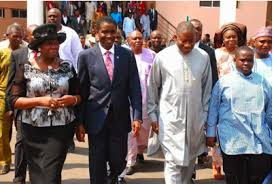This is the final part of the leadership write-up.
The history of Nigeria is painted, in most parts by our political leadership. From the time of our independence, the history of Nigeria has usually been recounted according to its political experiences, with particular reference to the political leader at the time. Political leadership is of course very important. For the simple reason that it has been covered exhaustively in my opinion, I would not dwell on it, except to mention that political leadership while being a key component in the growth of an economy should realize that it’s main purpose is to serve the populace. To work with the sectors of the economy to formulate policies and strengthen institutional frameworks that will allow for growth to occur. Sustainable growth.
Political leadership should come from a position of “How can we best instrumentalise all the parameters of government to work effectively with different sectors of the economy?” It requires an attitude of humility, servitude and commitment to the general good of the population.
While political leadership is important, the concept of leadership extends very widely to include business leadership, spiritual leadership, social leadership, and familial leadership, to name a few parameters. Thus, it is key to understand its wide applicability when prescribing effective leadership as a key component in the pathway for sustainable development.
This is because a thriving Nigeria depends on effective leadership that is demonstrated in different situations, the chairman of the boardroom, the teacher in the classroom, the family, the community councilor, non-governmental organizations, the unions, the decision on health policies, town planning activities and the sports arena.
At the various junctures in our daily lives, we come across complexities and issues that require decisions to be made. The pastor deciding on how best to lead the congregation and choosing to exemplify this by humility, the Imam demonstrating the tenets that Islam is a faith of love and acceptance, the business director choosing to empower staff by training them and rewarding them appropriately, there are many examples of the need for leadership.
It is not possible to cover all the aspects and issues regarding leadership in one article alone. But if the principles mentioned above are followed, principles of viewing Nigeria as a nation with many inter-related complexities that need to be broken down and tackled with the right attitude, then in every situation, choosing to understand the inter-relationships (please note that these inter-relationships also include the “others” points of views), and the focus is to find sustainable resolution to the complexities, then we will be on the right path. This is because there will be a detailed thinking-through of issues before action. And then there will be action. Responsible action.
An essay on leadership will be incomplete without mention of followership. While the word “followership” has several negative connotations including one of ruler/servant relationship or even more drastic, a master/slave relationship, leadership and followership are not in fact a binary relationship, where leadership is distinct from followership. I reiterate, the 2 are not a dichotomy, where there is a distinct “leader” and distinct “follower”, rather, one must view followership as important as leadership. Given that leadership is the ability to influence others, the ability for effective leadership to happen is the ability to influence others, meaning that the “others” must be able and willing to be influenced, or better put, must be in the position to be effectively influenced.
In this regard, we have leaders, and followers, working together as co-creators in growth: economic, political, social, spiritual or at the basic or, community.
Leadership is not an easy task. Rather it is a continuous process of decision making to tackle complexities, but also to think ahead, look into the future and prepare strategies to deal with any challenges that might occur in the future. It involves adapting, shaping and modifying. It is like a farmer who knows he must till the farm to yield a good harvest. Yet he also knows that after a few years, the ground must lie fallow to recover (adapting). While the ground is lying fallow, he prepares and plans for the course of planting that will take place after the fallow period is over, to ensure that the ground is used effectively and efficiently (modifying and shaping). Leadership learns from the past, is involved in the present and is prepared for the future.
I conclude by restating what I wrote in the beginning paragraphs to this piece. There is no problem with Nigeria. Nigeria is a complex country, and will continue to be so. However, these complexities are inter-related and can be broken down into simpler components. Once they are deconstructed into more manageable chunks, the issues can be tackled more effectively, and can be resolved concurrently, different parts being tackled by different teams.
The development process requires leadership. Leadership that thinks, and leadership that acts.
————-
This was printed in ThisDay Newspaper August 1, 2013

